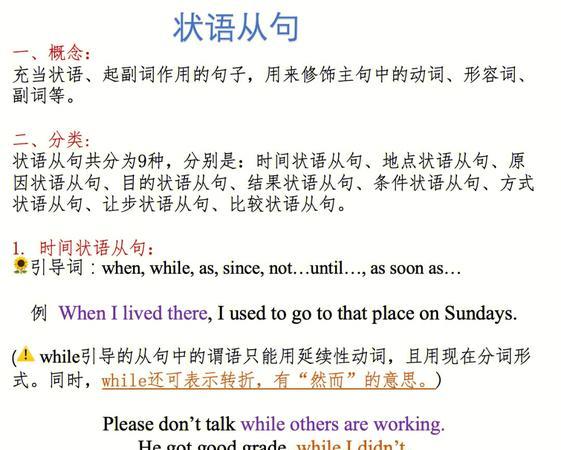状语从句是复合句中修饰动词、形容词、副词等的从句,可以根据表示的时间、地点、原因、条件、结果等划分为不同类型。时间状语从句表示动作或事件的时间,地点状语从句表示发生的地点,原因状语从句表示动作或事件的原因,条件状语从句表示动作或事件的条件,结果状语从句表示动作或事件的结果。掌握这些类型有助于理解复合句,提高英语写作和口语表达水平。

时间状语从句
时间状语从句表示一个动作或事件发生的时间,通常使用的连词有when, while, as, before, after, since, until等。例如:
- I'll call you when I arrive in London. (我到伦敦后会给你打电话。)
- While I was studying, my roommate was sleeping. (我在学习时,我的室友在睡觉。)
地点状语从句
地点状语从句表示动作或事件发生的地点,通常使用的连词有where, wherever等。例如:
- He went to the restaurant where he had his first date. (他去了他第一次约会的餐馆。)
- Wherever you go, I'll follow you. (无论你去哪里,我都会跟随你。)
原因状语从句
原因状语从句表示某个动作或事件的原因,通常使用的连词有because, since, as, now that等。例如:
- Because it was raining, we stayed at home. (因为下雨了,我们呆在家里。)
- Now that you're here, let's start the meeting. (既然你在这里了,我们开始开会吧。)
条件状语从句
条件状语从句表示某个动作或事件的条件,通常使用的连词有if, unless, as long as等。例如:
- If it rains tomorrow, we'll cancel the picnic. (如果明天下雨,我们会取消野餐计划。)
- You can go out as long as you finish your homework. (只要你完成作业,你就可以出去了。)
结果状语从句
结果状语从句表示某个动作或事件的结果,通常使用的连词有so, such that, that等。例如:
- He was so tired that he fell asleep immediately. (他太累了,以至于立刻睡着了。)
- The weather was so bad that we had to cancel the flight. (天气太糟糕了,我们不得不取消航班。)

